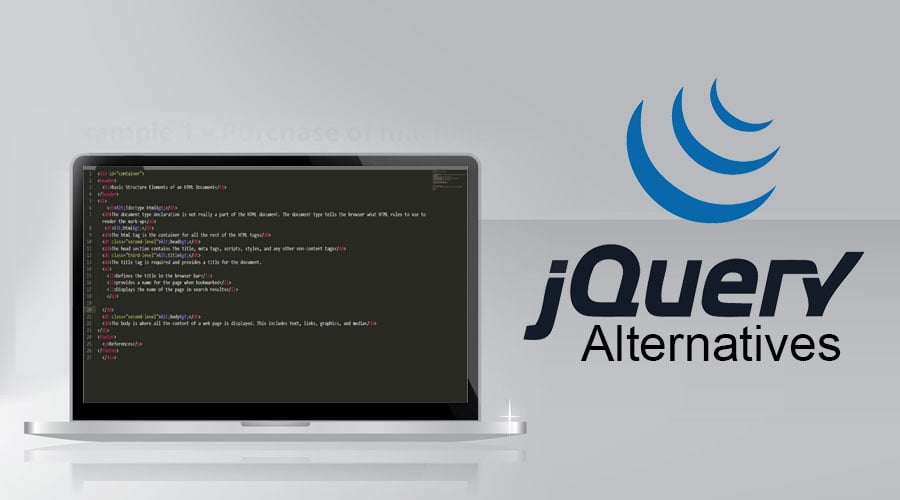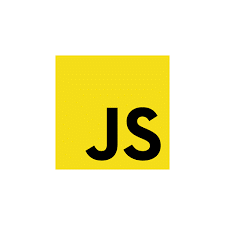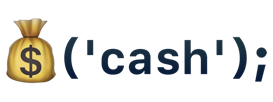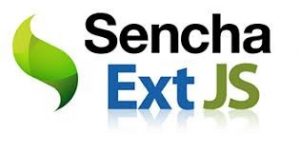Updated June 21, 2023

What is jQuery?
jQuery is a framework rather than a wrapper around the javascript. jQuery has become extremely important in the web because of various advantages. It is extremely lightweight compared to javascript and easy to learn and implement. jQuery pages load very quickly.
HTML, CSS, and Javascript are the technologies that are understood by the Web. HTML is used for defining the layout of the page, and CSS for the styling of the web pages. Javascript is the programming language of the web. Updating content, animations, and interaction of web pages with a user, all everything is controlled by javascript.
jQuery: Why or when should we look for jQuery Alternatives? Say you don’t need all the methods in jQuery API, and you would need only a few among them; you could look for alternatives. jQuery is around 250Kb. If you are looking for a smaller file that meets all your needs, you would want to look for jQuery Alternatives.
List of jQuery Alternatives
Given below is the list of jQuery alternatives:
1. JavaScript
Nevertheless, Native Javascript is one of the best jQuery alternatives; in fact, It is the framework of JS. Javascript is the best because any browser ships with javascript, and you do not need to install jQuery in your application. Also, JS is one of the best alternatives when you have to deal with some very old browsers which would look for only certain versions of jQuery. The only con of using it is syntax is not extremely friendly as jQuery provides.
Syntax:
var element = document.getElementById("media");element.classList.add("my style");2. Cash
Cash is a tiny plugin (~10% the size of jQuery) that supports browsers above IE10+. Its syntax is similar to jQuery. It might not have every feature that jQuery has, but it has almost every important essential feature that we would need.
Syntax:
var element = $("div");$(element).attr ( attrName, attrValue )3. UmbrellaJS
JQuery highly influences UmbrellaJS and has few extra features; also, the file is very small compared to mobile. Major browsers and IE11+ support UmbrellaJS. In UmbrellaJS, you can use native javascript methods on the umbrella selectors, unlike jQuery.
UmbrellaJS syntax is similar to that of jQuery with the difference of using u instead of $
Syntax:
u("button").on('click', function(){
alert("Hello world");
});4. Chibi JS
ChibiJS is developed to get rid of the large size of jQuery. ChibiJS is only around 7kb and has all the essential methods that are mostly used. Coming to Browser support, this supports all modern to old browsers. This plugin does not provide animations. Chibi executes DOM manipulations 20% to 50% faster than many libraries.
Chibi syntax is similar to jQuery to respect the fact that small and big library syntaxes should never be mixed
Syntax:
$("p").hide()5. ZeptoJS
ZeptoJS can be considered a minimalist javascript library with high compatibility with jQuery. The goal of this library is not to compete with jQuery but to achieve the maximum of its API with very less size. The size of ZeptoJS is only 5-10kB and downloads and executes very faster. Supports all major browsers and IE10+.
Syntax:
$.camelCase('hello-there')6. MooTools
Mootools is the collection of javascript utility functions for medium to advanced javascript programmers. It is a lightweight javascript framework. Its coherent and robust API allows for writing strong and flexible code. It has very good documentation available, and API is coherent.
Mootools is beneficial as it allows the user to choose their customized components. It follows object-oriented practices.MooTools provides DOM enhancements, enabling developers to add, modify, and delete any DOM elements. Element storage is also present in MooTools
Syntax:
$$('div.foo, div.bar’);
var myElement = new Element('div#bar.foo');
myElement.addEvent('click', function(){
alert(clicked!');
});7. ExtJS
ExtJS stands for Extended Javascript. It is a product from Sencha and is based on YahooUserInterface. It is a desktop application development programming language. All browsers, like IE6+, FF, Chrome, Safari, Opera, etc., support ExtJS. ExtJS is based on MVC/MVVM architecture.
ExtJS also provides a great collection of high-performance, customizable widgets.
Syntax:
var el = Ext.get("my-div");var el=Ext.Element.get("my-div");Apart from this, many other small frameworks are available that can do one task/functionality end to end. MicroJS is one site that has many micro frameworks available. On this website, we can only check for our requirements and utilize that framework.
Recommended Articles
We hope that this EDUCBA information on “jQuery Alternatives” was beneficial to you. You can view EDUCBA’s recommended articles for more information.







